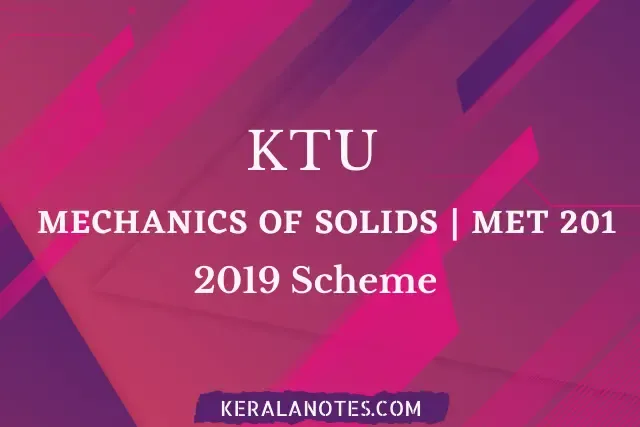The course MET201 - Mechanics Of Solids offered by the department of mechanical engineering at Kerala Technological University is a core subject for all students of mechanical engineering. The course is designed to provide the students with a strong foundation in the basic principles of mechanics of solids. The MOS course covers a wide range of topics, including the basics of mechanics of solids, stress and strain, elasticity and plasticity, fracture mechanics, and more.
The course notes for MET201 - Mechanics Of Solids MOS offered by Kerala Technological University are designed to provide the students with a strong foundation in the basic principles of mechanics of solids. The course covers a wide range of topics, including the basics of mechanics of solids, stress and strain, elasticity and plasticity, fracture mechanics, and more. The course notes are easy to understand and provide a complete overview of the course.
Kerala Notes is a site that provides easy-to-understand notes for students of KTU (Kerala Technological University). The notes are available for free and can be accessed by anyone. The site also has a forum where students can ask questions and get help from other students and the staff.
| Board | KTU |
| Scheme | 2019 New Scheme |
| Year | Second Year |
| Semester | S3 |
| Subject | MET 201 | Mechanics Of Solids |
| Credit | 4 |
| Category | KTU S3 Mechanical Engineering |
KTU S3 Mechanics Of Solids | MET 201 | Notes (2019 Scheme)
Mechanics Of Solids MOS is one of the most important subjects for anyone pursuing a degree or career in Mechanical Engineering. It is also one of the subjects in which students often struggle the most. The main reason for this is the vast amount of theoretical knowledge and the mathematical calculations required to do well in this subject.
Module 1
Module 1 - Syllabus
Deformation behavior of elastic solids in equilibrium under the action of a system of forces, method of sections. Stress vectors on Cartesian coordinate planes passing through a point, stress at a point in the form of a matrix. Equality of cross shear, Cauchy's equation. Displacement, the gradient of displacement, Cartesian strain matrix, strain-displacement relations (small-strain only), and Simple problems to find strain matrix. Stress tensor and strain tensor for plane stress and plane strain conditions. Principal planes and principal stress, the meaning of stress invariants, maximum shear stress. Mohr’s circle for the 2D case.
Module 1 - Notes
Module 1 Mechanics Of Solids | MET 201 HANDWRITTEN Notes
Module 2
Module 2 - Syllabus
Stress-strain diagram, Stress-Strain curves of Ductile and Brittle Materials, Poisson’s ratio. Constitutive equations-generalized Hooke’s law, equations for linear elastic isotropic solids in terms of Young’s Modulus and Poisson’s ratio, Hooke’s law for Plane stress and plane strain conditions Relations between elastic constants E, G, ν and K.
Calculation of stress, strain and change in length in axially loaded members with single and composite materials, Effects of thermal loading – thermal stress and thermal strain. Thermal stress on a prismatic bar held between fixed supports
Module 2 - Notes
Module 2 Mechanics Of Solids | MET 201 HANDWRITTEN Notes
Module 3
Module 3 - Syllabus
Torsional deformation of circular shafts, assumptions for shafts subjected to torsion within elastic deformation range, derivation of torsion formula Torsional rigidity, Polar moment of inertia, the basic design of transmission shafts. Simple problems to estimate the stress in solid and hollow shafts. Shear force and bending moment diagrams for cantilever and simply supported beams.
Differential equations between load, shear force, and bending moment. Normal and shear stress in beams: Derivation of flexural formula, section modulus, flexural rigidity, numerical problems to evaluate bending stress, economic sections. Shear stress formula for beams: Derivation, shear stress distribution for a rectangular section.
Module 3 - Notes
Module 3 Mechanics Of Solids | MET 201 HANDWRITTEN Notes
Module 4
Module 4 - Syllabus
Deflection of beams using Macauley’s method Elastic strain energy and Complementary strain energy. Elastic strain energy for axial loading, transverse shear, bending and torsional loads. Expressions for strain energy in terms of load, geometry and material properties of the body for axial, shearing, bending and torsional loads.
Castigliano’s second theorem, reciprocal relation, is proof for Castigliano’s second theorem. Simple problems to find the deflections using Castigliano’s theorem.
Module 4 - Notes
Module 4 Mechanics Of Solids | MET 201 PDF Notes
Module 5
Module 5 - Syllabus
Fundamentals of bucking and stability, critical load, equilibrium diagram for buckling of an idealized structure. Buckling of columns with pinned ends, Euler’s buckling theory for long columns. Critical stress, slenderness ratio, Rankine’s formula for short columns.
Introduction to Theories of Failure, Rankine’s theory for maximum normal stress, Guest’s theory for maximum shear stress, Saint-Venant’s theory for maximum normal strain, Hencky-von Mises theory or maximum distortion energy, Haigh’s theory for maximum strain energy Circumferential and Longitudinal stress in a thin cylindrical vessel, stresses in a thin spherical vessel
Module 5 - Notes
Module 5 Mechanics Of Solids | MET 201 PDF Notes
KTU S3 Mechanical Related Links
| KTU S3 Mech Syllabus | Click Here |
| KTU S3 Mech Study Notes | Click Here |
| KTU S3 Mech Reference Textbook | Click Here |
| KTU S3 Mech Previous Year Solved Questions | Click Here |
| KTU S3 Mech Study Materials | Click Here |
Other Related Links
| MAT 201 Partial Differential Equation And Complex Analysis | Click Here |
| MET 201 Mechanics Of Solids | Click Here |
| MET 203 Mechanics Of Fluids | Click Here |
| MET 205 Metallurgy & Material Science | Click Here |
| EST 200 Design And Engineering | Click Here |
| HUT 200 Professional Ethics | Click Here |
| MCN 201 Sustainable Engineering | Click Here |
| MEL 201 Computer-Aided Machine Drawing | Click Here |
| MEL 203 Materials Testing Lab | Click Here |







